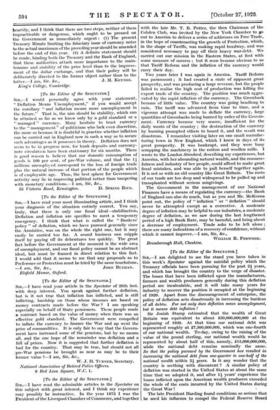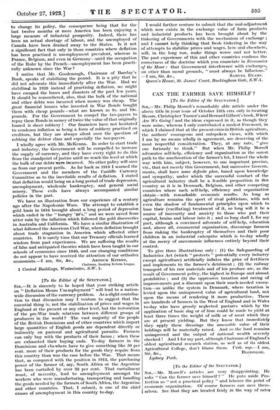[To the Editor of the SPECTATOR.]
SIRS I am delighted to see the stand you have taken in this week's Spectator against the suicidal policy which the Treasury officials have been pursuing for the past 21 years, and which has brought the country to the verge of disaster. The losses that have been inflicted upon the manufacturers, farmers and wealth producers generally during this deflation period are incalculable, and it will take many years for industry to recover the position it occupied at the beginning of 1920. Apart from the discouragement of enterprise, the policy of deflation acts disastrously in increasing the burdens of all debts. For not only does deflation mean unemployment, but it means debt inflation !
Sir Josiah Stamp estimated that the wealth of Great Britain was equivalent to about £30,000,000,000 at the beginning of 1920. At that time our national debt was represented roughly at £7,500,000,000, which was one-fourth of our national wealth. To-day, owing to the raising of the value of the pound sterling, our national wealth would be represented by about half of this, namely, £15,000,000,000, while the national debt remains nominally the same. So that the policy pursued by the Government has resulted in increasing the national debt from one-quarter to one-half of the national wealth within 2i years. Is it any wonder that the country is seething with discontent ? A similar policy of deflation was started in the United States at about the same time that we adopted it, and after 11 years' experience the losses inflicted upon the American wealth producers exceeded the whole of the costs incurred by the United States during the Great War
The late President Harding found conditions so serious that he used his influence to compel the Federal Reserve Board to change its policy, the consequence being that for the last twelve months or more America has been enjoying a large measure of industrial prosperity. Indeed, there has been an actual shortage of labour, and the unemployed of Canada have been drained away to the States. Is it not a significant fact that only in those countries where deflation has been practised is unemployment prevalent, whereas in France, Belgium, and even in Germany—until the occupation of the Ruhr by the French—unemployment has been practi- cally unknown since the War ?
I notice that. Mr. Goodenough, Chairman of Barclay's Bank, speaks of stabilizing the pound. It is a pity that he did not advocate this immediately after the War. Had we stabilized in 1920 instead of practising deflation, we might have escaped the losses and disasters of the past few years. It should be remembered, also, that the bulk of the national and other debts was incurred when money was cheap. The great financial houses who invested in War Bonds bought them with cheap pounds—what are known as 8s. and 10s. pounds. For the Government to compel the tax-payers to repay these Bonds in money of twice the value of that originally loaned is sheer robbery ! Our financiers have not hesitated to condemn inflation as being a form of robbery practised on creditors, but they are always silent over the question of robbing the debtor class and especially the tax-payers.
I wholly agree with Mr. McKenna. In order to start trade and industry, the Government will be compelled to increase the supply of currency, and they have every right to do this from the standpoint of justice until we reach the level at which the bulk of our debts were incurred. No other policy will save us from our present perils. As far back as 1918 I warned the Government and the members of the Cunliffe Currency Committee as to the inevitable results of deflation. I stated that deflation would bring on a long period of trade depression, unemployment, wholesale bankruptcy, and general social misery. These evils have always accompanied similar policies in the past.
We have an illustration from our experience of a century ago after the Napoleonic Wars. The attempt to establish a gold basis in 1816 brought about a long period of depression which ended in the " hungry '40's," and we were saved from utter ruin by the inflation which followed the gold discoveries in Australia and California. We have a similar illustration of what followed the American Civil War, where deflation brought about trade stagnation in America which affected other countries. It is surely time that our Treasury officials learned wisdom from past experiences. We are suffering the results of false and antiquated theories which have been taught in our schools of economies since 1840, and our changing conditions do not appear to have received the attention of our orthodox
Chairman, Banking Reform League.
1 Central Buildings, Westminster, S.W. 1.















































 Previous page
Previous page